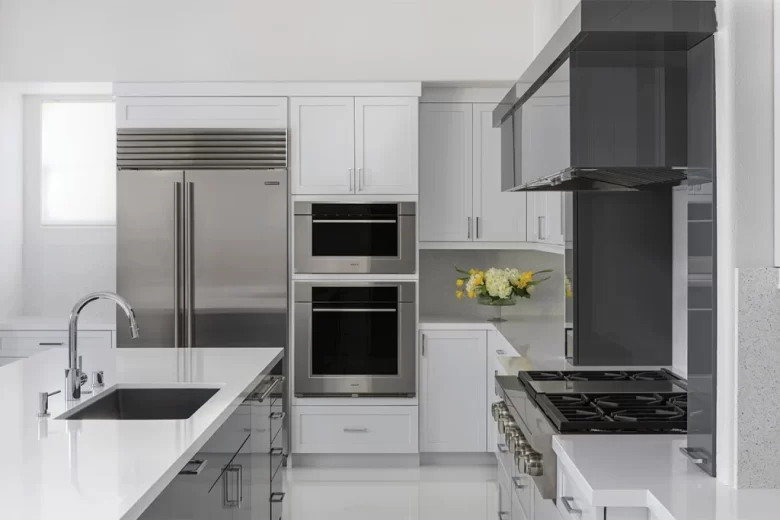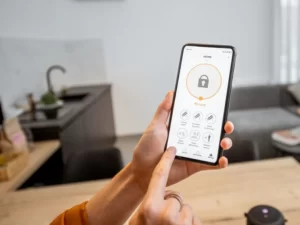The kitchen has long been the center of the home, and with the rise of smart kitchen appliances, it is increasingly becoming the center of innovation in the digital age. These advanced gadgets make cooking easier, more efficient, and more enjoyable, revolutionizing the way we prepare and consume food. Integrating technology into kitchen appliances like refrigerators and ovens is revolutionizing modern cooking in fascinating ways. Discover how smart kitchen gadgets are changing our cooking experience in this article.
1. Revolutionizing Cooking with Smart Ovens
One of the biggest kitchen gadgets transforming the modern kitchen is the smart oven. These ovens are equipped with features that increase cooking precision and convenience. With a smartphone app, you can control many smart ovens remotely from anywhere, change cooking parameters, or preheat the oven. They usually have integrated sensors that monitor the cooking process and automatically adjust the temperature and cooking time to ensure optimal results. Thanks to voice control, some models can even be controlled with basic voice commands.
Additionally, smart ovens often offer guided cooking modes that provide detailed instructions for preparing different dishes. These modes are ideal for home cooks who want to try out new recipes or ensure they are following the correct cooking techniques. Thanks to these advanced features of smart ovens, you can save time and energy more easily while achieving excellent results.
2. Enhancing Food Preservation with Smart Refrigerators
Another big development in kitchen technology is smart refrigerators. These appliances have features that help with food management and energy conservation, in addition to easy cooling. A common feature of smart refrigerators is an integrated camera that allows you to see what is happening inside the refrigerator from your smartphone. When you are at the grocery store, you can use this tool to check what items you already have. This can help you avoid buying duplicates and reduce food waste.
Additionally, many smart refrigerators come with inventory management systems that monitor the freshness of your food and alert you when products are about to expire. Meal planning can be made easier and more effective by using models that can even recommend recipes based on the ingredients you have on hand. Additionally, smart refrigerators often include energy-saving features, such as adaptive cooling systems that adjust based on usage patterns, which can help reduce your energy bills.
3. Streamlining Meal Preparation with Smart Cooktops
Smart stoves are designed to speed up meal preparation and increase accuracy. These stoves often use induction technology, which uses electromagnetic fields to directly heat pots and pans. This ensures more even and faster heating. Additionally, you can monitor the progress of your cooking and change the temperature settings of the smart stove remotely via a smartphone app.
Many smart cooktops come with advanced features, such as automatic pan detection, which ensures that the hob only heats up when there is a pan on it. By concentrating heat where it is needed, not only is energy efficiency improved, but it also increases safety by reducing the risk of burns. To give you precise control over your cooking, some models even come with built-in timers and cooking sensors that automatically turn off the heat when your meal reaches the right temperature.
4. Simplifying Food Preparation with Smart Dishwashers
Thanks to the integration of technology, smart dishwashers offer significant improvements in efficiency and convenience over traditional models. Often, these dishwashers come with features such as a remote control via a smartphone app, allowing you to operate, start, stop, or monitor the dishwasher from anywhere. To ensure that your dishes are ready for storage without having to constantly check on the appliance, you can also receive notifications when a cycle is complete.
Advanced cleaning technologies are often found in smart dishwashers to clean and sanitize more effectively, such as high-pressure jets and custom-fit spray arms. Additionally, some models come with wash cycles and water settings that can be adjusted depending on the type and amount of dishes being washed. This makes smart dishwashers an environmentally responsible option that not only improves cleaning performance but also saves water and energy.
5. Making Cooking More Efficient with Smart Slow Cookers
Smart slow cookers offer a convenient way to prepare food without a lot of work. These gadgets cook food slowly and for a long time, enhancing flavors and softening ingredients. With a smartphone app, you can control your smart slow cooker remotely and adjust the temperature and cooking time whenever you need to, even when you’re away from home.
Many smart slow cookers have programmable settings that allow you to schedule cooking times and automatically switch the appliance to keep warm mode when cooking is complete. This feature eliminates the need to constantly monitor the cooking process and ensures that your dinner is ready on time. Smart slow cookers are versatile and easy to use, making it easy to prepare delicious home-cooked meals.
Conclusion
The rise of smart kitchen gadgets is changing the way we cook, making it easier to prepare delicious meals quickly and efficiently. These advanced appliances include advanced features such as coffee makers, slow cookers, smart refrigerators, and ovens that simplify kitchen tasks, increase energy efficiency, and improve food preparation. By integrating technology into your kitchen, you can enjoy a more enjoyable and efficient cooking experience, which will ultimately increase your productivity and satisfaction during the time you spend there. Using smart kitchen gadgets helps create a modern, connected lifestyle that is in line with current technological developments, while also making food preparation easier.
FAQs
1. How does a smart refrigerator help organize food?
Smart refrigerators make food management easier with features such as built-in cameras that let you check on the contents remotely, inventory monitoring systems that check shelf life, and recommended recipes based on what is on hand. These features help you plan meals more successfully, minimize waste, and manage your food smarter.
2. What types of smart kitchen appliances are there?
There are many different types of smart kitchen appliances to choose from, including refrigerators, stoves, coffee makers, slow cookers, scales, and ovens. Each type is designed to improve cooking and food management and has unique features and functions that make it easier to achieve better results and speed up kitchen chores.
3. Can smart appliances work with other smart kitchen appliances?
Many smart kitchen appliances even work with other smart home appliances. They can often be integrated into an existing smart home ecosystem, allowing you to set up automated routines and improve the overall functionality of your home. For example, you can sync cooking times with temperature and lighting settings by connecting your smart oven to your smart home hub.
4. How do smart coffee machines improve the brewing process?
Smart coffee machines improve the brewing process by offering features such as remote control via a smartphone app, programmable brew times, and adjustable coffee strength and temperature. Additionally, some models have built-in voice assistants, so you can use voice commands to start brewing or change settings. These features ensure an easy and reliable coffee experience, tailored to your taste.
5. Are high-tech kitchen appliances worth the money?
If you value improvements in functionality, efficiency, and convenience in your kitchen, it may be worth investing in smart kitchen appliances. They have many benefits, such as better food management, faster cooking, and better results. When investing in smart appliances, you should consider your needs, budget, and the compatibility of the product with your current kitchen setup.




